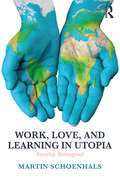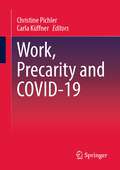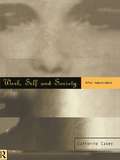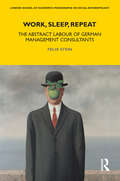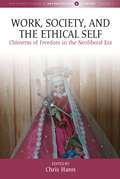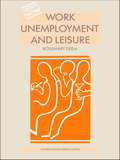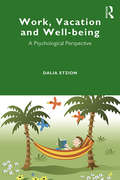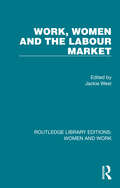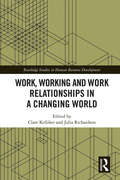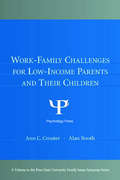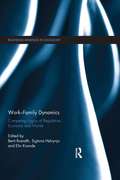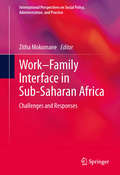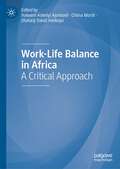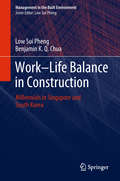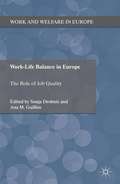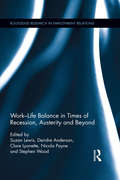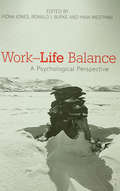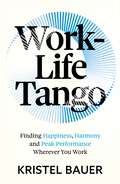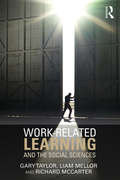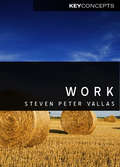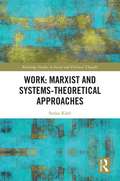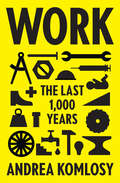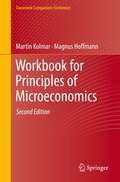- Table View
- List View
Work, Love, and Learning in Utopia: Equality Reimagined
by Martin SchoenhalsWork, Love, and Learning in Utopia breathes new life into the age-old human preoccupation with how to create a happier society. With a fascinating mix of research from cross-cultural psychology, macro history, and evolutionary biology, the book gives new credibility to the advocacy of radical equality. The author, a psychological anthropologist, argues that the negative emotions of sadness, anger, and fear evolved in tandem with hierarchy, while happiness evolved separately and in connection to prosociality and compassion. The book covers a wide range of human concerns, from economics and education, to media and communication, to gender and sexuality. It breaks new boundaries with its scope, arguing that equality of love is as important and possible as is economic equality. Its argument is provocative yet practical, and each chapter ends with concrete proposals that invite dialogue with any student of policy. Written in an easily accessible style, this book will appeal to anyone who has ever puzzled over how our social world could be remade. In particular, it will be very useful to students and scholars of anthropology, sociology, and psychology.
Work, Precarity and COVID-19
by Christine Pichler Carla KüffnerThe anthology presents the social consequences of the COVID-19 pandemic in the field of work and gainful employment from a multidisciplinary perspective of social and economic sciences. Specifically, it deals with the analysis of changes in work processes and relations in the course of the COVID-19 pandemic. Different facets of the discussion are taken up, and the topic of "work, precarity and COVID-19" is discussed along a wide range of diversity categories (age, gender, disability, social origin, ethnicity, religion, etc.) and their intersections (intersectionality). At the same time, the focus is on discussing alternative models and ways of dealing with the current crisis that (re)establish social justice and inclusion through work.The translation was done with the help of artificial intelligence. A subsequent human revision was done primarily in terms of content.
Work, Self and Society: After Industrialism
by Catherine CaseyDespite recent interest in the effects of restructuring and redesigning the work place, the link between individual identity and structural change has usually been asserted rather than demonstrated. Through an extensive review of data from field work in a multi-national corporation Catherine Casey changes this. She knows that changes currently occurring in the world of work are part of the vast social and cultural changes that are challenging the assumptions of modern industrialism. These events affect what people do everyday, and they are altering relations among ourselves and with the physical world. This valuable book is not only a critcal analysis of the transformations occurring in the world of work, but an exploration of the effects of contemporary practices of work on the self.
Work, Sleep, Repeat: The Abstract Labour of German Management Consultants (LSE Monographs on Social Anthropology)
by Felix SteinWork, Sleep, Repeat is a fascinating account of the work regime of German management consultants. Examining one of the most sought-after – and secretive – graduate professions, the book provides a first-hand account of the boardroom culture of Europe’s strongest economy. Analyzing how knowledge and power operate in this sector, Felix Stein explores a number of paradoxes. For example, while it is the job of management consultants to analyse the activities of other employees, they actually spend most of their time in luxurious seclusion away from them. In addition, despite having a strong sense of the importance of their work, consultants often find it difficult to explain to outsiders what it is they do. The book addresses these and other paradoxes by arguing that consultants are engaged in abstract labour. Anthropologists have long struggled with the question of how to describe contemporary work regimes which do not produce anything tangible. Stein demonstrates that elite work is predominantly abstract, in the fourfold sense that it is epistemically removed from the object of analysis, emotionally detached from it, several steps away from the assumed sources of economic value creation, and increasingly hard to grasp. In doing so, he offers new ways to think about white collar work and elites in the 21st century and establishes the notion of ‘abstract labour’ as a key category in social anthropology.
Work, Society, and the Ethical Self: Chimeras of Freedom in the Neoliberal Era (Max Planck Studies in Anthropology and Economy #7)
by Chris HannPrimarily on the basis of ethnographic case-studies from around the world, this volume links investigations of work to questions of personal and professional identity and social relations. In the era of digitalized neoliberalism, particular attention is paid to notions of freedom, both collective (in social relations) and individual (in subjective experiences). These cannot be investigated separately. Rather than juxtapose economy with ethics (or the profitable with the good), the authors uncover complex entanglements between the drudgery experienced by most people in the course of making a living and ideals of emancipated personhood.
Work, Unemployment and Leisure (Society Now)
by Rosemary DeemRosemary Deem provides students with a concise introduction to a range of issues and debates surrounding work, unemployment and leisure in contemporary societies. Beginning with an examination of the social and historical factors which have shaped work and leisure patterns in modern Britain, she shows how the boundaries between them are culturally constructed and change over time. As well as looking at the effects of class, Work, Unemployment and Leisure also considers gender, race and ethnicity dimensions. The author takes a wide view of work, encompassing work carried out both within and outside the formal economy. The chapter on unemployment considers the lives of those who are unemployed, and the impact of unemployment on work and leisure. There is a critical analysis of leisure itself and some recent controversies are considered. The final chapter contains a discussion of the future of work and leisure in industrial societies.
Work, Vacation and Well-being: Who's afraid to take a break?
by Dalia EtzionBased on a twenty-year research study, Work, Vacation and Well-being delves into the ubiquitous yet often-underestimated issues surrounding vacation and respite. Providing an original outlook on how breaks from work can be beneficial for the well-being of employees, this book also addresses the potential negative impacts of vacation. Taking into account factors concerning the nature of the break and the person taking it, Etzion delves into the benefits and drawbacks of workplace breaks, from annual leave to maternity leave and sabbaticals. Work, Vacation and Well-being looks at breaks from work through various social and cultural lenses, to present a balanced and well-researched perspective on all angles of taking a break. Perfect for students of Organizational and Health Psychology, Work, Vacation and Well-being also widely appeals to those studying Social Policy, Management Studies, Occupational Health and Research Methods.
Work, Women and the Labour Market (Routledge Library Editions: Women and Work)
by West JackieOriginally published in 1982, Work, Women and the Labour Market presents through original articles a coherent overall picture of women’s employment in contemporary British capitalism. For the first time it brings together concrete studies which show graphically how women’s unequal position at work is shaped by the capital-labour relation and by women’s place as housewives and mothers. The book illuminates the differences and similarities in women’s and men’s experience in the labour market and as members of the working class. It is about how and why women come to be in jobs typically regarded as semi or unskilled, about the causes of low pay, and about women workers’ consciousness as workers and as women. It looks at the role of trade unions in relation to women and to sexual divisions, and at how class and gender relations are woven together in the production process. The nine closely researched contributions examine the development of women’s and men’s work in clothing and other manufacturing industries, clerical work in local government, microelectronics in the office, the position of Asian and West Indian women in the labour market, women’s role in the family and part-time work, and women’s involvement and influence in trade unions.
Work, Working and Work Relationships in a Changing World (Routledge Studies in Human Resource Development)
by Clare Kelliher Julia RichardsonThis book is concerned with the rapid and varied changes in the nature of work and work relationships which have taken place in recent years. While technological innovation has been a key contributor to the nature and pace of change, other social and market trends have also played a part such as increasing workforce diversity, enhanced competition and greater global integration. Responding to these trends alongside cost pressures and the need for continued responsiveness to the environment, organizations have changed the way in which work is organized. There have also been shifts in product markets with growing demand for authenticity and refinement of the customer experience which has further implications for how work is organized and enacted. At the same time, employees have sought changes in their work arrangements in order to help them achieve a more satisfactory relationship between their work and non-work lives. Many have also taken increased responsibility for managing their own work opportunities, moving away from dependency on a single employer. The implications of these significant and widespread changes are the central focus of this book and in particular the implications for workers, managers, and organizations. It brings together contributions from an international team of renowned management scholars who explore the opportunities and challenges presented by technological and digital innovation, consumer, social and organizational change. Drawing on empirical evidence from Europe, North America and Australia, Work, Working and Work Relationships in a Changing World considers new forms of service work, technologically enabled work and independent professionals to provide in-depth insight into work experiences in the 21st Century.
Work-Family Challenges for Low-Income Parents and Their Children (Penn State University Family Issues Symposia)
by Alan Booth Ann C. CrouterThe area of work and family is a hot topic in the social sciences and appeals to scholars in a wide range of disciplines. There are few edited volumes in this area, however, and this may be the only one that focuses on low-income families--a particularly important group in this era of welfare-to-work policy. Interdisciplinary in nature, the volume brings together contributors from the fields of psychology, social work, sociology, demography, economics, human development and family studies, and public policy. It presents important work-family topics from the point of view of low-income families at a time in history when welfare to work programs have become standard. Divided into four parts, each section addresses a different aspect of the topic, consisting of a big picture lead essay which is followed by three papers that critique, extend, and supplement the final paper. Many of the chapters address important social policy issues, giving the volume an applied focus which will make it of interest to many groups. Serving to organize the volume, these issues and others have been encapsulated into four sets of anchor questions: *How has the availability, content, and stability of the jobs available for the working poor changed in recent decades? How do work circumstances for low-income families vary as a function of gender, family structure, race, ethnicity, and geography? What implications do these changes have for the widening inequality between the haves and have-nots? *What features of work timing matter for families? What do we know about the impacts of shift work, long hours, seasonal work, and temporary work on employees, their family relationships, and their children's development? *How are the child care needs of low-income families being met? What challenges do these families face with regard to child care, and how can child-care services be strengthened to support parents and to enhance child development? *How are the challenges of managing work and family experienced by low-income men and women? The primary audience for the book is academicians and their students, policy specialists, and people charged with developing and evaluating family-focused programs. The volume will be appropriate for classroom use in upper-level undergraduate courses and graduate courses in the fields of family sociology, demography, human development and family studies, women's studies, labor studies, and social work.
Work-Family Dynamics: Competing Logics of Regulation, Economy and Morals (Routledge Advances in Sociology)
by Berit Brandth Sigtona Halrynjo Elin KvandeWork-life integration is an increasingly hot topic in the media, social research, governments and in people’s everyday lives. This volume offers a new type of lens for understanding work-family reconciliation by studying how work-family dynamics are shaped, squeezed and developed between consistent or competing logics in different societies in Europe and the US. The three institutions of "state", "family" and "working life", and their under-explored primary logics of "regulation", "morality" and "economic competitiveness" are examined theoretically as well as empirically throughout the chapters, thus contributing to an understanding of the contemporary challenges within the field of work-family research that combines structure and culture. Particular attention is given to the ways in which the institutions are confronted with various moral norms of good parenthood or motherhood and ideals for family life. Likewise, the logic of policy regulation and gendered family moralities are challenged by the economic logic of working life, based on competition in favour of the most productive workers and organizations. Demonstrating different aspects of what is behind and between the logics of state regulation, morals and market, this innovative volume will appeal to students, teachers and researchers interested in areas such as family studies, welfare state studies, social policy studies, work life studies as well as and gender studies.
Work-Family Interface in Sub-Saharan Africa
by Zitha MokomaneProblems associated with work-family conflict do not belong to individual families alone, but have a major social and economic impact on the greater community. This scenario also holds true across sub-Saharan Africa, as nations enter the global economy and rising numbers of women enter the workforce. One of the first resources to focus on this region, Work-Family Interface in Sub-Saharan Africa probes rarely-studied dimensions of conflict between paid employment and family responsibilities. It balances theoretical background, empirical findings and current and emerging interventions for an insightful and practical review of ongoing issues affecting working women with families. Coverage contrasts concepts of work and family between the developing world and the West and related social concerns such as gender expectations and sexual harassment are examined in the work context. The book describes a range of family strategies for resolving work-family friction and chapters end with policy recommendations as first steps toward remedying longstanding challenges. Among the thought-provoking dispatches: Ghana: Managing work and family demands Nigeria: Strain-based family interference with work Botswana: The social impact of job transfer policy on dual-career families Kenya: The role of household help in work-family balance South Africa: State measures toward work-care integration Zambia: The quest for a family policy As evinced by these chapters, progress is gradual and far from uniform. As a guide for future study and future policy, Work-Family Interface in Sub-Saharan Africa is a substantial reference for sociologists, public health professionals, public and social policymakers and administrators.
Work-Life Balance in Africa: A Critical Approach
by Chima Mordi Hakeem Adeniyi Ajonbadi Olatunji David AdekoyaWork-life balance has drawn much attention from academic researchers, professionals, and politicians over the past two decades. However, despite the increased interest globally, there has been an under-representation of academic work on work-life balance across the African continent. So, this book serves as a collection of cases from various contexts across Africa and an exploration of the challenges and how best to manage human resources in this ‘Mother Continent’ with phenomenal potential. The book’s contributions draw on various types of research (conceptual, theoretical and empirical) and incorporate contextual issues such as technology, politics, culture, and economics to supplement the readers’ insights into the varying work-life balance experiences in African countries. By highlighting theoretical underpinnings and emphasising the practical relevance of issues related to managing work and non-work commitments, this book will offer an insightful guide for students and scholars interested in Business Management, Human Resource Management, Sociology of Work, and Industrial and Organisational Psychology in developing economies.
Work-Life Balance in Construction: Millennials in Singapore and South Korea (Management in the Built Environment)
by Low Sui Pheng Benjamin K. ChuaThe book presents the latest studies on the work–life balance of millennial (also known as Generation Y) building professionals in Singapore and South Korea. Its main goal is to compare and contrast the workplace attitudes of millennials, and to provide guidelines that help supervisors in the construction industry manage their employees’ expectations regarding work–life balance. Accordingly, it explains and links various principles regarding work–life conflicts, work–life enrichments and the work–life interface. Furthermore, the book introduces readers to coping strategies, a dimension that has not yet been explored substantially and has the potential to contribute significantly to the study and understanding of work–life balance. The book makes recommendations for the top management on assigning a capable leader to drive the changes in the organization, and on empowering the leader to implement effective strategies for promoting work–life balance, especially for the millennials who are now playing an increasing central role in the global construction sector.
Work-Life Balance in Europe: The Role of Job Quality (Work and Welfare in Europe)
by Sonja Drobnič Ana M. GuillénExamining the debate on quality of jobs in Europe, this book focuses on the work-life balance-a central element of the EU agenda. It addresses tensions between work and private life, examining job quality, job security, working conditions and time-use patterns of individuals and households as well as institutional contexts.
Work-Life Balance in Times of Recession, Austerity and Beyond (Routledge Research in Employment Relations)
by Stephen Wood Suzan Lewis Deirdre Anderson Clare Lyonette Nicola PayneThis book reflects the enormous interest in work-life balance and current pressing concerns about the impacts of austerity more broadly. It draws on contemporary research and practitioner experiences to explore how work-life balance and related workplace and social policy fare in turbulent economic times and the implications for employees, employers and wider societies. Authors consider workplace trends, practices and employment relations and the impacts on work, care and well-being of diverse workers. A guiding theme throughout the book is a triple agenda of supporting employee work-life balance, workplace effectiveness and social justice. The final chapters present case studies of innovative processes and organizational practices for addressing the triple agenda, note the important role of social policy context and discuss the challenge of extending debates on work-life balance to include a social justice dimension. This book will be of interest to academics and postgraduate students of organisational psychology, sociology, human resource management, management and business studies, law and social policy, as well as employers, managers, HR managers, trade unions, and policy makers.
Work-Life Balance in Times of Recession, Austerity and Beyond: Meeting the Needs of Employees, Organizations and Social Justice (Routledge Research in Employment Relations)
by Stephen Wood Suzan Lewis Deirdre Anderson Clare Lyonette Nicola PayneThis book reflects the enormous interest in work-life balance and current pressing concerns about the impacts of austerity more broadly. It draws on contemporary research and practitioner experiences to explore how work-life balance and related workplace and social policy fare in turbulent economic times and the implications for employees, employers and wider societies. Authors consider workplace trends, practices and employment relations and the impacts on work, care and well-being of diverse workers. A guiding theme throughout the book is a triple agenda of supporting employee work-life balance, workplace effectiveness and social justice. The final chapters present case studies of innovative processes and organizational practices for addressing the triple agenda, note the important role of social policy context and discuss the challenge of extending debates on work-life balance to include a social justice dimension. This book will be of interest to academics and postgraduate students of organisational psychology, sociology, human resource management, management and business studies, law and social policy, as well as employers, managers, HR managers, trade unions, and policy makers.
Work-Life Balance: A Psychological Perspective
by Ronald J. Burke Fiona Jones Mina WestmanWhat are the effects of conflict between home and work?Does work stress affect those who live with you? In the rapidly changing modern work environment, time pressures seem ever increasing and new technology allows work to be conducted any time and anywhere. These are just two of the factors that make it more and more difficult for working men and women to integrate work and home life. Consequently, there is a need for flexible and innovative solutions to manage the work-home interface.Work-Life Balance: A Psychological Perspective presents up-to-date information on work-home issues, including the latest research findings. The book’s emphasis is strongly psychological, with a focus on practical solutions, and includes chapters which deal with psychological issues such as the conflict between work and family, how work stresses may affect partners, and recovery from work. It also includes sections on legal issues, as well as examples of initiatives being implemented by leading employers. Contributors are drawn from the leading researchers in their fields and reflect the international character of the current challenges facing employers and employees.Its practical focus and innovative approach make this an essential book for managers, HR professionals and organizational psychologists, as well as students in these disciplines. The theoretical basis and research focus mean the book will also be invaluable for researchers investigating workplace issues.
Work-Life Tango: Finding Happiness, Harmony and Peak Performance Wherever You Work
by Kristel BauerThe familiar concept of work-life balance endures, but does anyone actually boast of having a healthy ratio of work and personal time? Very few do, because our model for work/life leads to burn out - it asks individuals to chase a dream where work and life are both equal and distinct, where the demands of one do not contradict the demands of another. Simply giving 100% to the twin pillars of your life will not give you the work/life balance you crave. The good news is, there's a much more intelligent, holistic and effective way to live your life.Life has never fit into tidy little boxes. Family and social needs don't stop between 9:00 a.m. and 5:00 p.m., and work pressures bleed into the hours between 5:01 p.m. and 8:59 a.m. all the time. And since the pandemic, the lines have become even more blurred, with remote workers bearing the brunt of the impact. It's time to embrace new wellness strategies, This book will show how taking a holistic and integrative approach to the complex demands of life and work will transform your happiness and producitivity.The book will contain three parts.· Part I will focus on strategies to thrive as an individual; specifically, maintaining a healthy mind and body by prioritizing oneself. You'll learn how to integrate healthy lifestyle habits into and throughout your workday, so that taking care of yourself won't compete with productivity but will support it. · Part II will focus on thriving at work. You'll learn about checkpoints and how to use these moments to wake up and realign your well-being with your personal mission. You'll learn how to create healthy boundaries, work through the common challenges that remote workers face and provide approachable solutions that you can immediately start integrating into your work life. Team leaders will gain key insights for managing remote and flexible teams so that they can create the conditions for success.· Part III is about thriving in relationships. While community and connection are vital to well-being, many workers struggle to form and maintain these bonds. This book will explain why connection is vital, and show how to encourage it. By identifying your personal mission and integrating the wellness strategies provided in TheWork/Life Tango, you'll be able to show up 100% in all aspects of life-in your career, for your family and friends, and for yourself.
Work-Life Tango: Finding Happiness, Harmony and Peak Performance Wherever You Work
by Kristel BauerThe familiar concept of work-life balance endures, but does anyone actually boast of having a healthy ratio of work and personal time? Very few do, because our model for work/life leads to burn out - it asks individuals to chase a dream where work and life are both equal and distinct, where the demands of one do not contradict the demands of another. Simply giving 100% to the twin pillars of your life will not give you the work/life balance you crave. The good news is, there's a much more intelligent, holistic and effective way to live your life.Life has never fit into tidy little boxes. Family and social needs don't stop between 9:00 a.m. and 5:00 p.m., and work pressures bleed into the hours between 5:01 p.m. and 8:59 a.m. all the time. And since the pandemic, the lines have become even more blurred, with remote workers bearing the brunt of the impact. It's time to embrace new wellness strategies, This book will show how taking a holistic and integrative approach to the complex demands of life and work will transform your happiness and producitivity.The book will contain three parts.· Part I will focus on strategies to thrive as an individual; specifically, maintaining a healthy mind and body by prioritizing oneself. You'll learn how to integrate healthy lifestyle habits into and throughout your workday, so that taking care of yourself won't compete with productivity but will support it. · Part II will focus on thriving at work. You'll learn about checkpoints and how to use these moments to wake up and realign your well-being with your personal mission. You'll learn how to create healthy boundaries, work through the common challenges that remote workers face and provide approachable solutions that you can immediately start integrating into your work life. Team leaders will gain key insights for managing remote and flexible teams so that they can create the conditions for success.· Part III is about thriving in relationships. While community and connection are vital to well-being, many workers struggle to form and maintain these bonds. This book will explain why connection is vital, and show how to encourage it. By identifying your personal mission and integrating the wellness strategies provided in TheWork/Life Tango, you'll be able to show up 100% in all aspects of life-in your career, for your family and friends, and for yourself.
Work-Related Learning and the Social Sciences
by Gary Taylor Liam Mellor Richard McCarterWork-Related Learning and the Social Sciences provides a clear and accessible introduction to the theory and practice of work. Written in a student friendly style, it makes use of the following: Theoretical Perspectives: The theoretical foundations of identity, power, community, citizenship, experiential learning and a range of employability skills provide frameworks for the chapters. Key issues: The book addresses such issues as: How are people socialised at work? Why does conflict occur at work? What types of control are exerted at work? What can we learn about our communities from the work we do? How can we develop our employability skills? Sector examples: Extensive use is made of examples of the working practices of teachers, social workers, police officers, civil servants, third sector workers as well as from people engaged in low skilled work. The student voice: The student voice draws upon the relationship between their own experiences of work and the key issues covered in the book. Written as an introductory text for students studying the social sciences, it deals with the ways in which students can appreciate the sociology and politics of work and develop an understanding of their own skills and employability. This book is particularly relevant to students studying work-related learning as part of their social science degrees and to those who wish to enhance their employability and prospects in graduate level employment.
Work: A Critique (Key Concepts)
by Steven VallasThis book provides a critical overview of the myriad literatures on “work,” viewed not only as a product of the marketplace but also as a social and political construct. Drawing on theoretical and empirical contributions from sociology, history, economics, and organizational studies, the book brings together perspectives that too often remain balkanized, using each to explore the nature of work today. Outlining the fundamental principles that unite social science thinking about work, Vallas offers an original discussion of the major theoretical perspectives that inform workplace analysis, including Marxist, interactionist, feminist, and institutionalist schools of thought. Chapters are devoted to the labor process, to workplace flexibility, to gender and racial inequalities at work, and to the link between globalization and the structure of work and authority today. Major topics include the relation between work and identity; the relation between workplace culture and managerial control; and the performance of emotional labor within service occupations. This concise book will be invaluable to students at all levels as it explores a range of insights to make sense of pressing issues that drive the social scientific study of work today.
Work: Marxist and Systems-Theoretical Approaches (Routledge Studies in Social and Political Thought)
by Stefan KühlUsing Marxist and systems theory as guides, this book offers an entry point to the current debate on the role of economy in modern society, the change in work organizations and the effect of the economy on the individual. It explores the concepts of ‘work society’, ‘industrial society’ and ‘capitalist society’ to explain the conditions of society as a whole, and not just the conditions of businesses, making particular use of the category of ‘work’. The first systematic theoretical comparison of Marxism and systems theory, it provides a brief overview of the central debates concerning work society and the controversies surrounding organizations in capitalism. As such, it will appeal to social scientists and social theorists with interests in the sociology of work, industry and organizations.
Work: The Last 1,000 Years
by Loren Balhorn Andrea Komlosy Jacob WatsonTracing the complexity and contradictory nature of work throughout historyBy the end of the nineteenth century, the general Western conception of work had been reduced to simply gainful employment. But this limited perspective contrasted sharply with the personal experience of most people in the world—whether in colonies, developing countries or in the industrializing world. Moreover, from a feminist perspective, reducing work and the production of value to remunerated employment has never been convincing.Andrea Komlosy argues in this important intervention that, when we examine it closely, work changes its meanings according to different historical and regional contexts. Globalizing labour history from the thirteenth to the twenty-first centuries, she sheds light on the complex coexistence of multiple forms of labour (paid/unpaid, free/unfree, with various forms of legal regulation and social protection and so on) on the local and the world levels. Combining this global approach with a gender perspective opens our eyes to the varieties of work and labour and their combination in households and commodity chains across the planet—processes that enable capital accumulation not only by extracting surplus value from wage-labour, but also through other forms of value transfer, realized by tapping into households’ subsistence production, informal occupation and makeshift employment. As the debate about work and its supposed disappearance intensifies, Komlosy’s book provides a crucial shift in the angle of vision.
Workbook for Principles of Microeconomics (Classroom Companion: Economics)
by Martin Kolmar Magnus HoffmannThis Second Edition updates the companion workbook to match the new edition of the textbook Principles of Microeconomics. Each chapter features a wide variety of exercises, ranging from basic multiple-choice questions to challenging mathematical problems and case study scenarios. The textbook pursues an integrative approach to modern microeconomics by critically reflecting on the main findings of economics from a philosophical standpoint and comparing them to approaches found in the social sciences. It adopts an institutional perspective to analyze the potential and limitations of different market types, and highlights implications for the design of the legal system and business practices throughout. In addition to traditional rational-choice models, important findings from behavioral economics and psychology are also presented.
